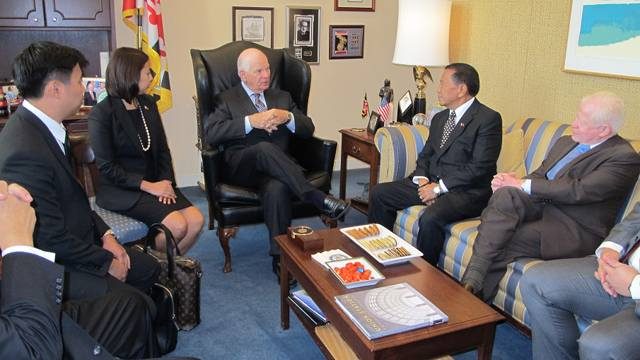SUMMARY
This is AI generated summarization, which may have errors. For context, always refer to the full article.

MANILA, Philippines – Nearly 6 months after Super Typhoon Yolanda (Haiyan) devastated the Visayas, American lawmakers renewed their support for rehabilitation and reconstruction efforts.
Echoing the pronouncements of US President Barack Obama during his state visit here on Monday, US congressional leaders expressed hope for the immediate recovery of the victims, and assured the Philippine government of continued assistance.
In a statement on Saturday, May 3, the Philippine embassy in Washington DC said the American legislators delivered the message in meetings with Vice President Jejomar Binay, who visited Capitol Hill on Thursday.
“Vice President Binay’s congressional meetings showed that the bipartisan support of the US for the Philippines and the Philippines-United States alliance is rooted in the US Congress which represents the American people,” said Philippine Ambassador Jose Cuisia Jr, who accompanied Binay in the meetings.
The following are the US lawmakers Binay and Cuisia met with:
- Maryland Senator Ben Cardin, chairman of the US Senate Subcommittee on East Asian and Pacific Affairs
- California Representative Ed Royce, chairman of the House Committee on Foreign Affairs
- Ohio Representative Steve Chabot, chairman of the House Subcommittee on Asia and the Pacific.
Cardin, Royce, and Chabot also assured the Philippines of their support for closer defense cooperation, and “building capabilities to respond to catastrophes and natural disasters.”
The world’s most powerful typhoon, Yolanda (Haiyan) ravaged central Philippines on November 8, 2013, killing over 6,000 and leaving millions homeless. More are believed to have died.
The US was among the first to offer assistance in the aftermath of the storm, deploying troops and military equipment to help in rescue and relief efforts. This became one of the justifications for the signing of a military agreement on Monday, April 28, that allows US forces greater access to Philippine bases.
The Philippine embassy said that in the US congressional leaders’ meetings with Binay, they also “pointed to the importance of the US rebalance to the Asia Pacific region.”
It was a reference to the Obama administration’s so-called pivot or “strategic rebalance” of American foreign policy to the Asia Pacific region after Iraq, Afghanistan and the Middle East dominated the White House’s attention in the last decade.
The Asian “pivot” drew sharper focus after Obama’s 4-nation trip to Asia. Besides the Philippines, Obama also visited allies Japan, South Korea and Malaysia.
Developing maritime security
In a separate statement, the US Department of Defense said the Pentagon also reiterated US commitment to helping the Philippines develop its maritime domain awareness and maritime security capabilities.
The topics were discussed during Binay’s meeting with Acting US Deputy Defense Secretary Christine H. Fox at the Pentagon on Friday, May 2.
“James Swartout, a spokesman for Fox, said the acting deputy secretary congratulated Binay on the recent signing of the Enhanced Defense Cooperation Agreement, which deepens US engagement with the Philippines,” the Pentagon said.
Swartout added that Fox and Binay talked about the “productive discussions” between the US, Philippine, and other regional leaders at the US-Association of Southeast Asian Nations Defense Forum in Hawaii last April. US Defense Secretary Chuck Hagel hosted the forum.
“The two leaders also discussed regional security developments, including recent events in the South China Sea,” Swartout said.
The Philippines is locked in a territorial dispute with China over parts of the South China Sea (West Philippine Sea to the Philippines). Proponents of the military agreement with the US said the deal acts as a “security blanket” and helps ensure maritime security as China increasingly becomes assertive in the region.
Critics though plan to question its constitutionality before the Philippine Supreme Court. They lamented the secrecy behind the crafting of the deal and insist that it requires approval of the Philippine Senate. – with reports by Ayee Macaraig/Rappler.com
Add a comment
How does this make you feel?
There are no comments yet. Add your comment to start the conversation.